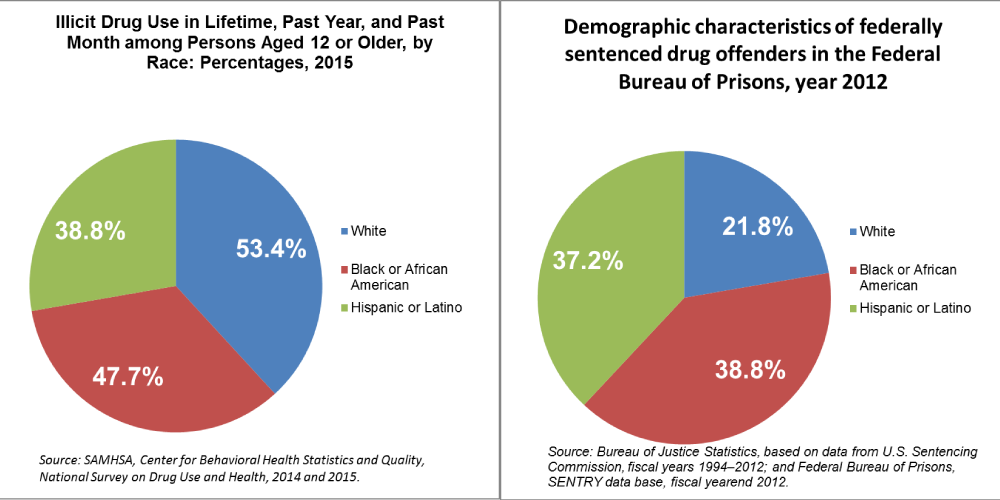Identifying Racial Bias in Treatment for Substance Use Disorders
Third in a series addressing implicit bias in health care
Implicit bias among health care providers is a key factor contributing to racial and ethnic health disparities. Since implicit biases are automatic and subconscious associations that are expressed through attitudes and stereotypes, they can influence judgements and discriminatory behavior toward particular groups of people. This is dramatically apparent in treatment for drug and alcohol problems for people of color and in how our society repeatedly fails at providing treatment at potential points of intervention.
Individuals with drug and alcohol addiction encounter bias throughout their many points of contact within the criminal justice and health care systems, two of the main systems that serve as potential points for providing treatment. This bias is compounded when racial dynamics come into play, and we see these potential points of intervention turned into missed opportunities in a way that disproportionately affects people of color.
Pointing People in the Direction of Treatment, Not Jail
 One point of potential intervention is when individuals with substance use disorders come into contact with law enforcement. Recently released data by National Survey on Drug Use and Health continues to support the pattern of White Americans using illegal drugs at a slightly higher rate than Black Americans. Ideally, people needing treatment and encountering law enforcement would be referred to treatment or other services. However, Black Americans are far more likely to be arrested for drug possession than White Americans with the result that “nearly 80 percent of people in federal prison and almost 60 percent of people in state prison for drug offenses are black or Latino.” An investigation in California revealed disproportionate criminalizing of people of color with substance use disorders. The findings show how racial biases create a system that punishes addiction for one subset of people and encourages access to treatment for another.
One point of potential intervention is when individuals with substance use disorders come into contact with law enforcement. Recently released data by National Survey on Drug Use and Health continues to support the pattern of White Americans using illegal drugs at a slightly higher rate than Black Americans. Ideally, people needing treatment and encountering law enforcement would be referred to treatment or other services. However, Black Americans are far more likely to be arrested for drug possession than White Americans with the result that “nearly 80 percent of people in federal prison and almost 60 percent of people in state prison for drug offenses are black or Latino.” An investigation in California revealed disproportionate criminalizing of people of color with substance use disorders. The findings show how racial biases create a system that punishes addiction for one subset of people and encourages access to treatment for another.
Another potential point of intervention is within the health care system. When individuals with substance use disorders have interactions within a hospital, mental health clinic or at a doctor’s office, their race matters. Studies looked at how mental health providers treated Latino and White adolescents who also had substance use disorders. The providers were less likely to refer Latino adolescents to substance use treatment than Whites.
Implicit bias also interferes with doctors’ ability to accurately assess their patients’ needs because of doctors’ assumptions about who is likely to be addicted to drugs. Studies on pain management show that Black and Hispanic patients are less likely to receive opioids pain medicine for equivalent levels of pain than Whites. Researchers hypothesized that this was partly due to some doctors’ false belief that Blacks are more likely to misuse drugs and less likely to feel pain. Other research finds that doctors tend to empathize less with patients of races different from their own, a problem exacerbated by the fact that only about 4 percent of the country’s practicing physicians are black.
Implicit bias is a complex problem that is not easily identified with studies and data even when it appears evident from the personal stories our advocates have collected. It is further complicated due to the fact that it is driven by the subconscious and subliminally reinforced throughout society. Often conversations surrounding bias and race are met with resistance from those with power and privilege, but addressing implicit bias within health care settings is not meant to be a personal affront on the character of any individual provider. Addressing implicit bias is an indictment of the systems in place that continue to fail those vulnerable populations who feel its impact the most.
So, what’s next?
Building and maintaining awareness around implicit bias is the first step. Our society needs to act. Community Catalyst is working to address implicit bias as well as overt discrimination. Our Center for Consumer Engagement in Health Innovation is focusing on advancing health equity as one of its priorities. Our Substance Use Disorders Project advocates for better health services and community supports to address substance use disorders and help people lead healthier lives. Community Catalyst looks forward to working with all its partners to tackle this issue and achieve equity.